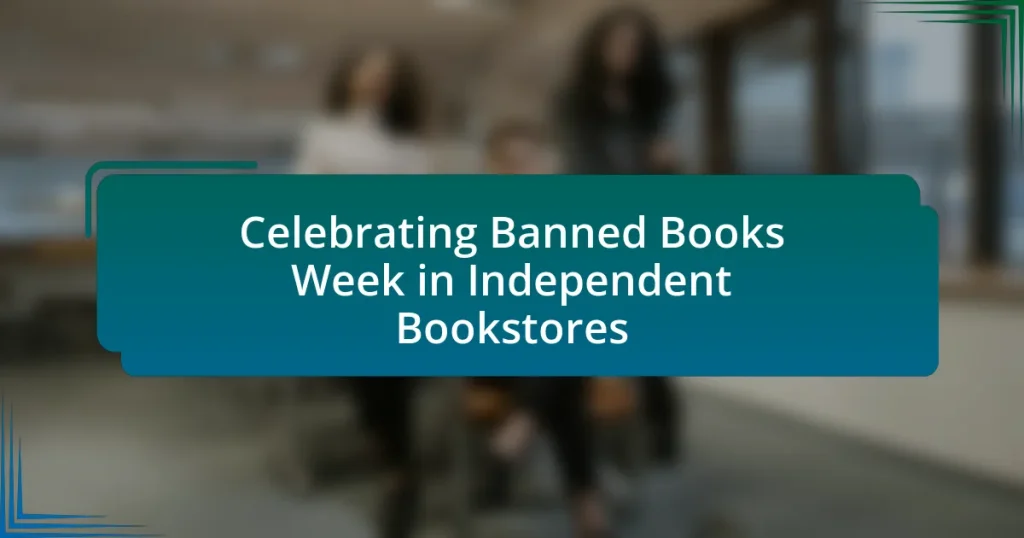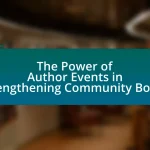Celebrating Banned Books Week in independent bookstores is an initiative that raises awareness about censorship and promotes the importance of free expression through literature. This annual event, observed since 1982, encourages independent bookstores to host readings, discussions, and displays of books that have been challenged or banned, highlighting the significance of diverse voices in literature. The article explores the historical context of Banned Books Week, the role of independent bookstores in advocating for intellectual freedom, and the various strategies they employ to engage the community in discussions about censorship and the right to read. Additionally, it addresses the challenges faced by these bookstores and the resources available to support their efforts during this critical week.
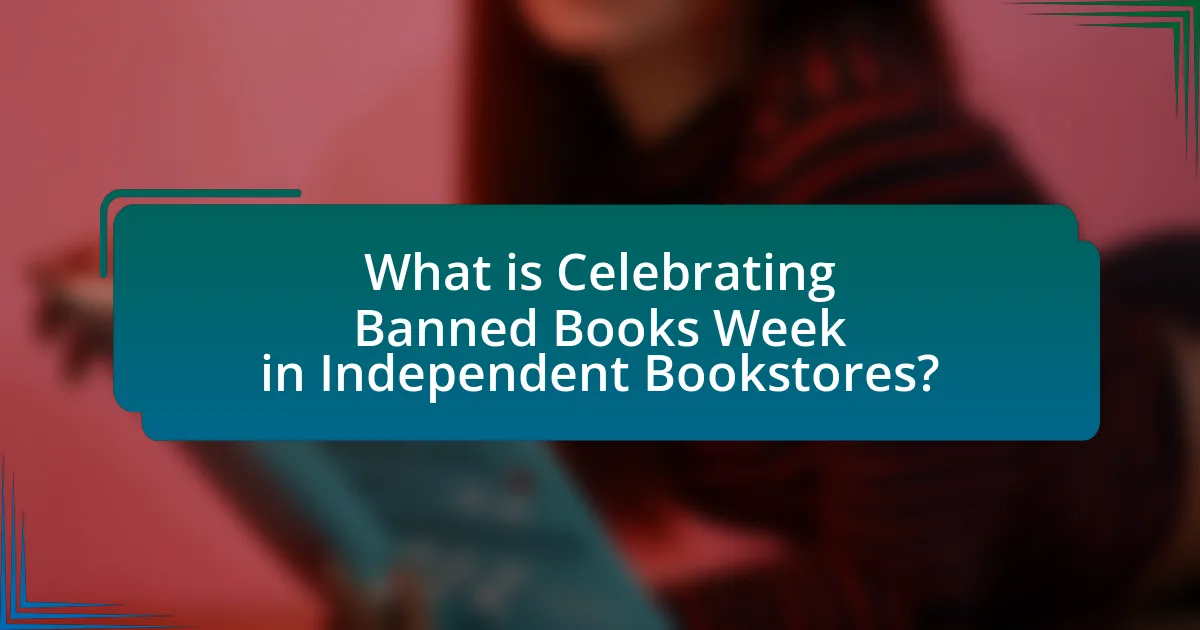
What is Celebrating Banned Books Week in Independent Bookstores?
Celebrating Banned Books Week in independent bookstores is an initiative aimed at promoting awareness of censorship and the importance of free expression through literature. During this week, independent bookstores often host events such as readings, discussions, and displays featuring books that have been challenged or banned in various contexts. This celebration highlights the significance of diverse voices in literature and encourages community engagement in defending the right to read. According to the American Library Association, Banned Books Week has been observed since 1982, emphasizing the ongoing challenges to intellectual freedom and the need for advocacy in support of access to all literature.
Why is Banned Books Week important for independent bookstores?
Banned Books Week is important for independent bookstores because it highlights the value of intellectual freedom and the role of bookstores in promoting diverse voices. This annual event encourages independent bookstores to showcase banned or challenged books, fostering community discussions about censorship and the importance of access to varied perspectives. By participating, independent bookstores can attract customers who are passionate about free expression, thus increasing foot traffic and sales. Additionally, according to the American Library Association, over 11,000 books have been challenged since 1982, underscoring the ongoing relevance of this issue and the need for bookstores to advocate for literary freedom.
What historical context surrounds Banned Books Week?
Banned Books Week originated in 1982 as a response to the increasing number of book challenges and bans occurring in schools and libraries across the United States. The American Library Association (ALA) initiated this event to highlight the importance of the freedom to read and to draw attention to the censorship of literature. Since its inception, Banned Books Week has served as a platform for advocating against censorship and promoting the value of diverse perspectives in literature, reflecting ongoing societal debates about the boundaries of acceptable content in educational and public spaces.
How do independent bookstores participate in Banned Books Week?
Independent bookstores participate in Banned Books Week by hosting events, displaying banned and challenged books, and engaging the community in discussions about censorship. These bookstores often organize readings, panel discussions, and book clubs focused on the themes of freedom to read and the importance of diverse literature. For instance, in 2022, many independent bookstores showcased displays of banned books, highlighting titles that have faced challenges in schools and libraries, thereby raising awareness about censorship issues. This active participation not only promotes the visibility of these books but also fosters a dialogue about the implications of banning literature, reinforcing the role of independent bookstores as advocates for intellectual freedom.
What themes are highlighted during Banned Books Week?
Banned Books Week highlights themes of censorship, freedom of expression, and the importance of diverse literature. This annual event emphasizes the need to protect the right to read and the value of access to a wide range of viewpoints. According to the American Library Association, the week serves to raise awareness about the challenges faced by authors and readers due to book bans, showcasing the impact of censorship on society and culture.
How do themes of censorship and freedom of expression manifest in independent bookstores?
Independent bookstores often serve as bastions of freedom of expression, actively resisting censorship by promoting diverse voices and controversial literature. These establishments frequently curate selections that include banned or challenged books, thereby fostering an environment where readers can engage with a wide range of ideas and perspectives. For instance, during Banned Books Week, many independent bookstores host events and discussions that highlight the importance of intellectual freedom, showcasing titles that have faced censorship in schools and libraries. This commitment to free expression is evidenced by the American Booksellers Association’s support for independent bookstores in advocating against censorship, emphasizing their role in upholding democratic values through literature.
What role do diverse voices play in the celebration of Banned Books Week?
Diverse voices play a crucial role in the celebration of Banned Books Week by highlighting the importance of representation and the impact of censorship on various communities. These voices bring attention to the narratives that are often marginalized or silenced, emphasizing the need for inclusivity in literature. For instance, during Banned Books Week, independent bookstores often feature events that showcase works by authors from diverse backgrounds, which not only fosters a richer literary culture but also encourages discussions about the reasons behind the censorship of specific titles. This celebration serves as a platform for advocating freedom of expression and the right to access a wide range of perspectives, reinforcing the idea that literature should reflect the diversity of society.
How do independent bookstores promote awareness during Banned Books Week?
Independent bookstores promote awareness during Banned Books Week by hosting events, displaying banned books prominently, and engaging the community through social media campaigns. These activities create a platform for discussions about censorship and the importance of intellectual freedom. For instance, many independent bookstores organize read-aloud events featuring excerpts from banned books, which not only highlights the titles but also encourages dialogue about the reasons behind their censorship. Additionally, statistics from the American Library Association indicate that hundreds of books are challenged or banned each year, underscoring the relevance of these initiatives. By actively participating in Banned Books Week, independent bookstores reinforce their role as advocates for free expression and literacy.
What events and activities are commonly organized by independent bookstores?
Independent bookstores commonly organize events such as author readings, book signings, and community discussions. These activities foster engagement with local authors and promote literary culture. For instance, during Banned Books Week, many independent bookstores host read-alouds of challenged books, panel discussions on censorship, and educational workshops that highlight the importance of intellectual freedom. These events not only attract customers but also raise awareness about the issues surrounding banned literature, reinforcing the role of independent bookstores as community hubs for dialogue and advocacy.
How do social media campaigns enhance the celebration of Banned Books Week?
Social media campaigns enhance the celebration of Banned Books Week by increasing awareness and engagement around the event. These campaigns utilize platforms like Twitter, Facebook, and Instagram to share information about banned books, promote discussions, and encourage participation in related activities. For instance, the American Library Association actively uses social media to highlight specific banned books, share quotes, and provide resources for advocacy, which helps to reach a broader audience. Additionally, statistics show that social media posts related to Banned Books Week can generate significant interaction, with hashtags like #BannedBooksWeek trending, thereby amplifying the message and fostering a community of support for intellectual freedom.
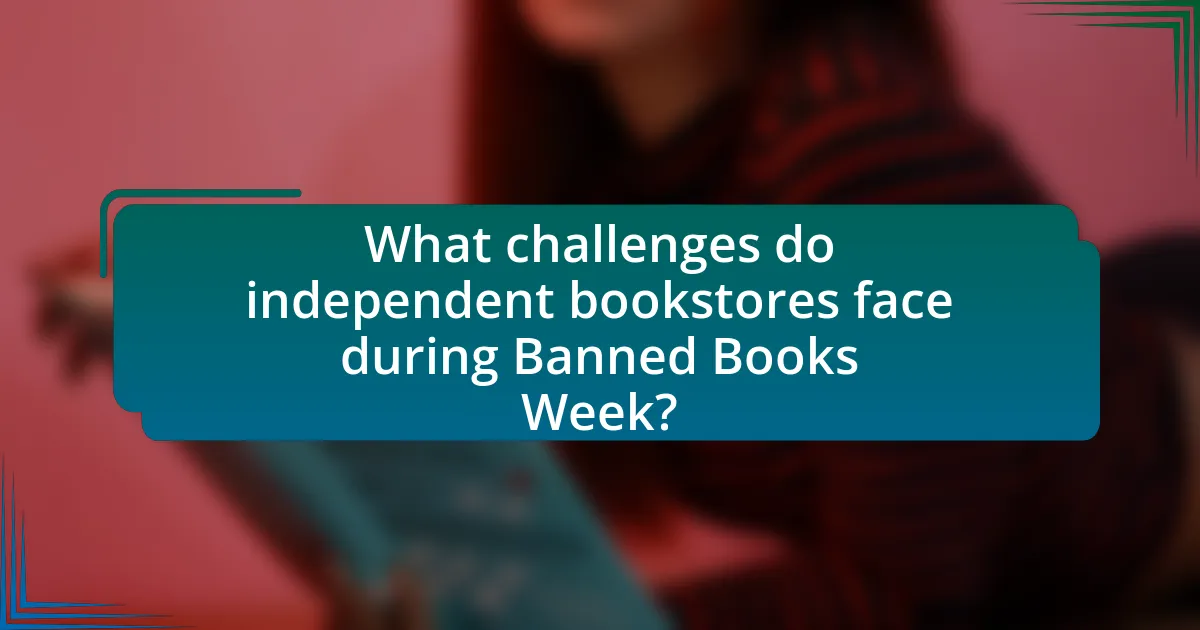
What challenges do independent bookstores face during Banned Books Week?
Independent bookstores face significant challenges during Banned Books Week, primarily due to increased scrutiny and potential backlash from communities regarding the books they choose to promote. This scrutiny can lead to decreased sales as some customers may avoid stores that feature banned or controversial titles. Additionally, independent bookstores often operate with limited resources, making it difficult to engage in extensive marketing or advocacy efforts to counteract negative perceptions. According to the American Booksellers Association, independent bookstores reported a 20% decline in sales during periods of heightened censorship discussions, illustrating the financial impact of these challenges.
How can independent bookstores overcome challenges related to censorship?
Independent bookstores can overcome challenges related to censorship by actively promoting freedom of expression and curating diverse collections that include banned or challenged books. By hosting events such as readings, discussions, and panels during Banned Books Week, these bookstores can raise awareness about censorship issues and engage the community in conversations about the importance of access to varied viewpoints. Furthermore, independent bookstores can collaborate with organizations like the American Library Association, which provides resources and support for combating censorship, thereby reinforcing their commitment to intellectual freedom. This proactive approach not only helps to counteract censorship but also fosters a culture of inclusivity and open dialogue within the community.
What strategies can bookstores implement to foster open discussions about banned books?
Bookstores can implement strategies such as hosting community events, creating dedicated display sections for banned books, and facilitating book clubs focused on these titles to foster open discussions about banned books. Community events, such as panel discussions or author talks, encourage dialogue and provide a platform for diverse perspectives on censorship and literature. Dedicated display sections highlight banned books, drawing attention to their significance and inviting customers to engage with the content. Additionally, book clubs centered on banned books create a safe space for readers to share their thoughts and experiences, promoting critical thinking and understanding of the issues surrounding censorship. These strategies not only raise awareness but also empower customers to explore challenging topics in literature.
How can community partnerships support independent bookstores during this week?
Community partnerships can support independent bookstores during this week by organizing events that promote banned books and encourage community engagement. For instance, local schools, libraries, and organizations can collaborate with bookstores to host readings, discussions, or workshops focused on the importance of intellectual freedom and the impact of censorship. This collaboration not only drives foot traffic to the bookstores but also raises awareness about banned books, fostering a culture of reading and discussion. According to the American Library Association, events like these can significantly increase community participation and support for independent bookstores, especially during Banned Books Week, which aims to highlight the value of diverse literature.
What resources are available for independent bookstores during Banned Books Week?
Independent bookstores have access to various resources during Banned Books Week, including promotional materials, educational toolkits, and community engagement initiatives. The American Library Association (ALA) provides a toolkit that includes posters, bookmarks, and social media graphics to help bookstores promote the event and raise awareness about censorship. Additionally, independent bookstores can participate in events such as read-alouds and discussions, which are often organized by local libraries or advocacy groups. These resources are designed to support independent bookstores in fostering dialogue about the importance of intellectual freedom and the impact of book banning.
Where can bookstores find promotional materials for Banned Books Week?
Bookstores can find promotional materials for Banned Books Week through the American Library Association (ALA) website, which offers a variety of resources including posters, bookmarks, and social media graphics. The ALA provides these materials to support awareness and advocacy for banned and challenged books, making them accessible to bookstores participating in the event. Additionally, bookstores can access promotional toolkits and ideas for events directly from the ALA, ensuring they have the necessary materials to effectively celebrate Banned Books Week.
What organizations provide support for independent bookstores celebrating this week?
The American Booksellers Association (ABA) and the Association of American Publishers (AAP) provide support for independent bookstores celebrating Banned Books Week. The ABA offers resources, promotional materials, and events to engage communities in discussions about censorship and the importance of diverse literature. The AAP collaborates with bookstores to highlight the significance of intellectual freedom and the right to read, providing advocacy and educational tools. These organizations play a crucial role in empowering independent bookstores during this week dedicated to celebrating the freedom to read.
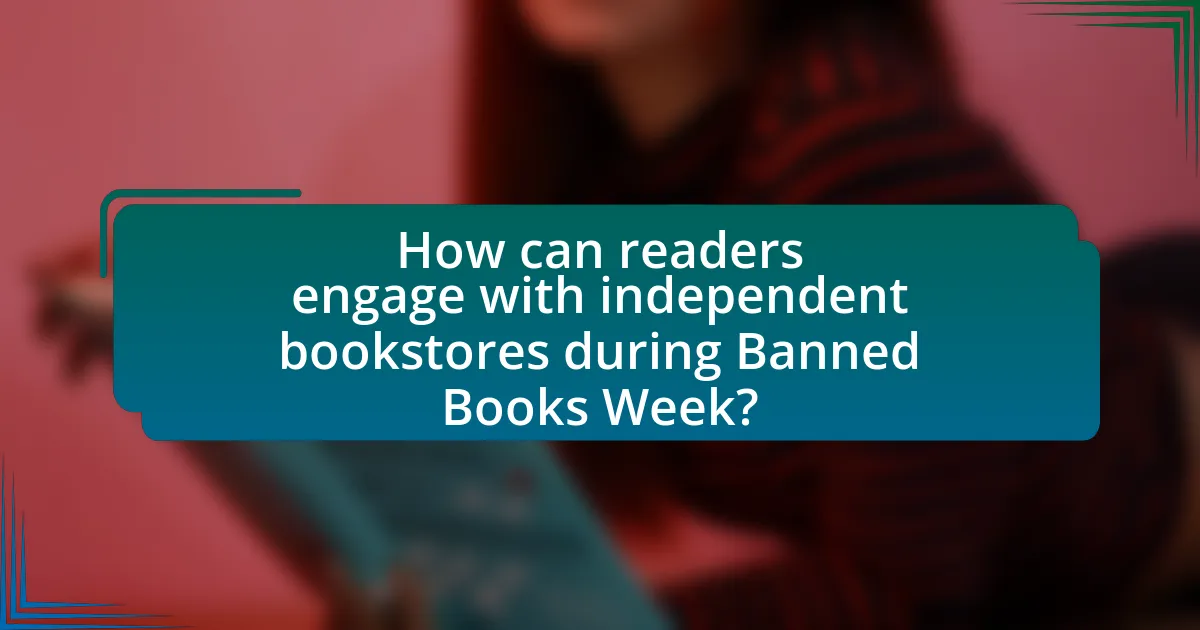
How can readers engage with independent bookstores during Banned Books Week?
Readers can engage with independent bookstores during Banned Books Week by participating in events such as book readings, discussions, and signings that focus on banned or challenged literature. Many independent bookstores host special promotions, display banned books prominently, and offer curated lists to raise awareness about censorship. According to the American Library Association, Banned Books Week serves to highlight the importance of free access to information and the impact of censorship, making it an ideal time for readers to support local bookstores that champion these values.
What actions can readers take to support independent bookstores during this celebration?
Readers can support independent bookstores during this celebration by purchasing books directly from these stores. This action not only boosts their sales but also fosters community engagement and promotes the importance of diverse literature. According to the American Booksellers Association, independent bookstores contribute significantly to local economies, with studies showing that for every $100 spent at a local bookstore, approximately $68 stays in the community, compared to $43 when spent at a national chain. Additionally, readers can participate in events hosted by these bookstores, such as readings or discussions, which help raise awareness about banned books and encourage a culture of free expression.
How can readers participate in events hosted by independent bookstores?
Readers can participate in events hosted by independent bookstores by attending scheduled readings, discussions, and workshops that focus on banned books. Many independent bookstores promote these events through their websites, social media platforms, and newsletters, allowing readers to stay informed about upcoming activities. Additionally, readers can engage by purchasing featured banned books, which often supports the bookstore’s efforts to raise awareness about censorship and freedom of expression. Participation can also include joining book clubs or community discussions organized by the bookstore, fostering a collective dialogue around the themes of banned literature.
What are the benefits of purchasing banned books from independent bookstores?
Purchasing banned books from independent bookstores supports freedom of expression and promotes diverse viewpoints. Independent bookstores often curate selections that reflect unique perspectives, allowing readers access to literature that challenges societal norms. Additionally, buying from these stores helps sustain local economies, as independent bookstores reinvest profits into their communities. According to the American Booksellers Association, independent bookstores contribute significantly to local job creation and community engagement, reinforcing the importance of supporting these establishments in the face of censorship.
What are some best practices for celebrating Banned Books Week in independent bookstores?
Independent bookstores can effectively celebrate Banned Books Week by hosting events that promote awareness and discussion around censorship. Organizing readings of banned or challenged books allows community members to engage with the material directly, fostering dialogue about the importance of intellectual freedom. Additionally, displaying a curated selection of banned books prominently in the store encourages customers to explore these titles, highlighting their significance.
Collaborating with local authors, educators, or activists for panel discussions or workshops can further enrich the celebration, providing diverse perspectives on censorship and its implications. Offering discounts on banned books during this week can incentivize purchases and increase visibility for these works.
According to the American Library Association, Banned Books Week serves as a reminder of the importance of the First Amendment and the need to protect the freedom to read, making these practices not only relevant but essential for independent bookstores aiming to advocate for literary freedom.
How can independent bookstores create inclusive environments for discussions about banned books?
Independent bookstores can create inclusive environments for discussions about banned books by hosting open forums and events that encourage diverse perspectives. These events can include panel discussions featuring authors, educators, and activists who can share their insights on censorship and the importance of literary freedom. Additionally, bookstores can provide safe spaces for community members to express their thoughts and feelings about banned literature, fostering dialogue that respects all viewpoints. Research indicates that inclusive discussions can enhance community engagement and understanding, as seen in initiatives like the American Library Association’s Banned Books Week, which promotes awareness and advocacy for intellectual freedom. By actively involving the community and providing resources for education on the implications of book banning, independent bookstores can effectively support inclusive conversations around this critical issue.
What tips can bookstores follow to maximize community engagement during Banned Books Week?
Bookstores can maximize community engagement during Banned Books Week by hosting events that promote discussion and awareness of banned literature. Organizing panel discussions with local authors, educators, and activists can foster dialogue about censorship and the importance of free expression. Additionally, creating a display featuring banned books, along with informative signage about their histories and reasons for being banned, can attract attention and encourage patrons to explore these titles. Engaging with local schools and libraries to collaborate on events or reading challenges can further enhance community involvement. According to the American Library Association, Banned Books Week serves as a reminder of the importance of the First Amendment and the need to protect the freedom to read, making these activities not only relevant but essential for community engagement.
